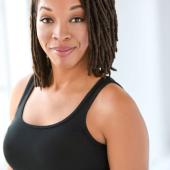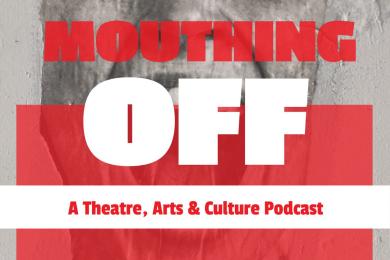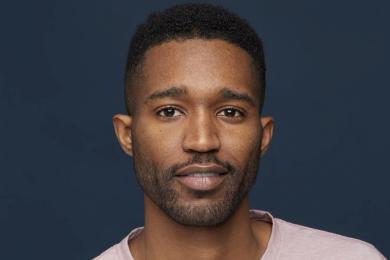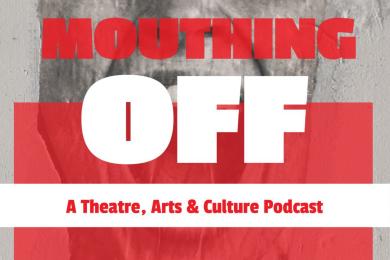"you sign up to go into battle for the rest of your life."
Rushing in from a big gig, as actors often do, I am so happy Sun Mee took the time to meet with me. She had just performed at Ramsey Women’s Prison with Ten Thousand Things; a company known for its dynamic works and plays that can travel literally anywhere. I learned about Sun Mee’s travel and how her stories and artistry couldn’t be shaken from her even if she tried. She has such a warm spirit and a wisdom I’m sure she didn’t even know she had shown me. I am so happy to bring you the story of her hustle; with the hopes that you, the reader, find the calling to continue your important work.
So how did your show go?
Good! We opened at Ramsey Women’s prison and it just brings it all back down to what’s important and real and what resonates with (the specific audience). Joy (Dolo, who’s Hustle story you can find on mnplaylist) Carries a lot in the show.
How long have you been working in the Twin Cities?
I moved back here from New York in 2005 but before that I lived here in the 90’s. I have been here all together for 17/18 years. So 2005, (She counts on her fingers) 18 years!
But not all together so how long did you spend in New York?
7 years. I went for grad school (she is a graduate of Tisch) and I stayed four more years for work.
What prompted you to come back here?
You know, I felt that New York was really hard. I worked with Theatre Mu before I moved out to New York and it was kind of like home. It was the first time I got to be in a play about Korean adoption; the first time they were looking for actors who looked like me. I also knew I wanted to write or create my own work. Everyone in new york thought I was crazy when I would say I wanted to move back to Minnesota.
Did they not think we had good theatre here?
I mean, a lot of people, once they go to New York they wanna stay. But for me, I grew up in the midwest (Detroit Michigan), and I just felt like I wanted green, sunset, grass, and New York was such a grind. It was really hard. Most of the time when you try to make it in New York you just end up doing regional theatre, so I was never there I was always subletting my place and touring the country. I just wanted to sleep in my own bed! (We laugh, or I did cause that was funny). I wanted to work with Mu again, it was such an unexpectedly great town (Minneapolis/St paul).
That’s Awesome! I was just talking to someone today about how I don’t like Pittsburgh (Sorry I just don’t) and about how its all steel and metal and I need water and green in my city!
Well you know I am from Detroit (same as H. Adam and Aimee Bryant) and as much as I love Detroit and would want to live there, there is just not enough theatre. This place is just a really good place to live; you can support yourself with your art. You still gotta hustle but you can live a good life.
Can you tell me about yourself, non-theatre related things? Like “I like the color purple and went to California once!”
Well, I am a Korean adoptee. My dad is Jewish. I love Argentinian Tango and modern dance. I speak spanish and sign language. I love to travel, I’ve been to a lot of places with beaches. I’ve been back to Korea four times. I met my birth family! I was on a reality television show in Korea and through it I found my birth family (WHHHAAATTT?? -my reaction) Yea I wrote a piece about it and performed it about four years ago. I’d like to live abroad someday. I am not sure where but I want to live somewhere else for an extended period of time. I wanna explore Brazil, France, Southeast Asia.
Is it typical that Korean adoptees in America search for their birth parents? Is it a thing that a lot of Korean adoptees try to do?
There are a lot of Korean adoptees who want to search. International adoption started in Korea after the Korean war. We are the guinea pigs. We are the first ones to come of age and want to go back. This is a weird statistic but there are more Korean adoptees in Minnesota than any other place in the world. There is over 12,000 in minnesota and the next closest amount is in france of 8,000. It’s just common knowledge in the adoptee community. Theatre Mu has done a lot of shows about adoption.
Would you say that there is a trend or themes in Asian American Theatre that explores adoption?
Minnesota has generated a lot. Mu has at least produced 5-10 plays about adoption since the early 1990’s. More plays about Korean adoption has been done in Minnesota than in the country. I am actually working on an anthology.
It’s so cool that you’re doing this.
(I just blushed), Thank you! I just had a dream one day to write about people! Okay okay, when you first came to Minneapolis (or for each time you came) did you find it hard to get noticed or to break in the scene? If so what did you do to get noticed? Or was it very welcoming?
It was super welcoming because the first company I worked with was Theatre Mu and they were super happy that I was here! I did my first play on Korean adoption. And then it felt very welcoming. I felt like without even putting myself out that much I was invited to shows at the Guthrie, Penumbra, Mixed Blood. In New York you are always trying to get people to remember who you are and here, I moved back and the Guthrie calls saying “ I heard you’re back in town”!
So many cool things are happening here I can’t even keep up.
Is there a time where you weren’t working enough in theatre to support you? What did you do to keep up with the bills?
I’ve done a lot of temping. Waitressing. In New York I had a dry spell. It was too stressful to work in theatre so I was temping 50 hours a week and not really acting. Still had trouble paying the bills. I actually moved back to Minnesota to quit acting! I came to work at a temp job at the builders association of Minnesota and my friend had just wrote a play that was being produced at the History Theatre. The lead woman, who is also a friend of mine, dropped out. She said, “ as a favor to me would you just do this just audition”. So I did that and then the Guthrie called and . . . I really believe that if you step away from theatre and you are meant to do theatre it will call you back. I really believe that. I feel like right now I want a break and I will have one this summer but you have to walk away sometimes to know if it’s still something you wanna do. As far as hustling now; I am auditioning for commercials, I am in a show, I mentor, direct, teach (in multiple organizations - Mu, Guthrie)
I don’t make a lot of money but I am very happy to say that I do support myself through my art even after only working here for three years. I always am after a gig but there are slivers of time I need to hold tight to because I’ll have a meeting after a rehearsal after a meeting and a break sounds nice. Do you feel like by taking a break you are missing out on anything, any opportunities?
I feel that it is important as an artist to listen to that really still and small voice inside to ask yourself, “am I doing my purpose in life, am I doing what I want to be doing?”. I don’t wanna make choices out of fear. Fear out of not having money or not being able to work again. You aren’t putting out the best energy. Last summer was very busy; I joyfully directed with Penumbra’s summer institute and I was assistant directing a summer program at the Guthrie so I worked 7 days a week. Then I got called for an audition out in New York so I had to leave for a little bit and I just- we can’t burn ourselves out. Even though a break feels scary, you will come back with healthier energy.
I like that. I like that a lot “Healthier Energy”. So with that, how many job titles have you had at one time?
Let’s see teacher, mentor. . (counting again) 5 or 6?
So if someone came up to you and asked you what you did for a living what would you say?
I just say artist, or actor/playwright. I also used to dance but I mostly say artist. To most people it’s all the same (we laugh).
What is the oddest job you’ve had or one where you knew it was not gonna work out?
I tried waitressing like 4-5 years ago and I made it a week. I had to stop because my boss tried to say I was vacuuming wrong. And I was like uh uh. I worked in a sushi restaurant once and I made it one day. I’m not cut out for it.
Another interesting thing, I was in new york I just closed a show and I decided to stay for a few months to feel it out. I was temping at a financial firm, for some reason I always work in finance. They had a goal for me to help them reach 26 million dollars in 6 weeks. It was a big project I worked on 40 hours a week that turned into 50-70 hours. I’d leave for auditions. I ended up in the elevator 45 floors going down. I was standing with the CEO. He says to me , “I hear good things about you what would it take to get you to stay?”. I say “ I am an actor” he says something like, “how many words would it take me to convince you that’s not financially feasible?”.
His wife was an artist who wrote the theme song for Cheers. His children were artists. He gave me all these reasons to quit. I told him I wasn’t ready for that, I wasn’t ready to give up. I just felt so dead working there.
That’s so sad that artists hear this all the time. My great granny used to ask me “what else?” like I had to do something else to survive. I don’t think people value what artists bring to the world.
I was just at the Prince tribute the other day and thinking about what this man gave the world. How can people not think that is valuable?
I do these interviews and sometimes my questions get answered before I ask. Can you tell me about a time in your career where you were about ready to give up? We kind of touched on it earlier when you said you quit acting and moved to minnesota.
I was working a few places and I just wasn’t going to be an actor at all. But I got pulled back in. I felt that this (Minneapolis/ST.PAul) was a good place, a supportive environment to do it. I encourage everyone to walk away to see if it calls you back. You’ll be a different person when it calls you back.
I love that! So what is your proudest career moment?
I think it was performing my one woman show How to Be a Korean Woman. I performed it in Korea at a conference for about 250 Korean Adoptees from 17 different countries. I was worried about the language barrier because everyone was from a different country but everyone got it! Its a physical play. I asked the audience who was here to search (for birth families) and about half of the audience raised their hands. Some were reunited. Some searched but had been rejected. Some were scared to search. My goal with that show was to bring light to the inner world of Korean adoptees. A lot of narratives of Korean adoptees in theatre have been told by adoptive parents. There is a whole wave of adoptees telling it from their perspective so they can talk about racism, discrimination, rejection from Koreans. It was not an easy thing. I had a tech crew that didn’t speak english so whenever I wanted a light cue to change on stage I had to snap! (We laugh). I’d be like “and then I went over here (snap)”.
I’ve done the show in multiple theatres in town every show sold out. I feel like people resonate with loss and search for wholeness.
So even with your success, you’ve done a lot of great stuff, are their barriers that hold you back. That keep you from getting to that next level?
I think the main thing is that mainstream theatres say they are more open to diversity in casting, but when it comes to certain shows they are still gonna cast white people. One of the weirdest things for me is that I am adopted by a Jewish family and I have never in my life been able to play a Jewish person. Is it really diversity in casting and everyone has an equal opportunity or is it not? Is the playing field really level or is it not?
There’s a glass ceiling even for people who are well meaning. There are blind spots. Historically we are not even used to being considered for these theatres so we have a whole learning curve when it comes to auditioning for them.
To see a play about Jewish people and know that half the people up there are not jewish is weird.
And you are Jewish?? (I had to double check, I felt ignorant)
Yes! I remember I was 16 years old going on an audition for Anne Frank and being like “ oh yea I’m gonna get that!”. And I killed it! And then I didn’t even get a callback. My friends who weren’t jewish and were white all got callbacks. And so I remember my theatre teacher talking to the director and the director said “ I would never even consider casting an Asian Anne”. And my mind was so innocent I remember thinking, “but I am jewish!”.
How powerful would that production have been with an Asian Anne. I think it’s about the family being Jewish but Drake is Jewish and he’s black.
Yea so it’s just like, is it a talk of equal opportunity or is it truly equal opportunity. Because to get opportunities for people like you and me means that people running the theatre have to advocate for us. I don’t know how you feel, but my friends who are asian-american and older than me say, “you sign up as a person of color in the arts, you sign up to go into battle for the rest of your life”. Not that everyday feels hard but it’s a struggle for visibility, opportunity and having an authentic voice. And change is slow.
Was there a time that someone didn’t believe in you?
Yea when I was in high school, I was one of the few asian people in high school. I went to a performing arts magnet high school ( with Audra McDonald AHHHHH). My theater teacher who I loved and who loved me tried to be really honest and sat me down and said “you know as an Asian person you are only gonna be considered for old people and character roles. You’ll never play a leading woman”. At the time half of me believed her and half of me denied it. But it really made me more determined. Theatre Mu was a part of helping me become a leading woman. I think it’s good to be wired in a way where people say these things but you take it as a challenge.
We are both women of color and I think a lot of people lump our experiences, especially in the arts. I have always heard that it’s gonna be hard. But I think I have heard more Asian-American women tell me how someone has told them what they can or cannot do. More times than black women or any POC in the arts. . .
Well it’s interesting. In Hollywood more and more black actors, writers and directors are being recognized (still few and far between compared to whites) but people will say “Oh people of color are being recognized” but you look and it’s like there are no Asians! So yea, I feel like you sign up for a fight. It’s a struggle, your whole career.
With that being said. Is there a personal goal you still have for your career? And are there things you wanna see change in the MPLS/STPAUL scene? Pushing for more Korean adoptee stories or anything?
Yea. I think more Asian American stories need to be told. More collaborations between artists. The biggest thing I wanna advocate for is the hiring of local actors. It’s so frustrating when actors come in from New York that aren’t that much better. I love that in Minnesota you don’t work here unless you are a kind person who gets along with people. It can be a whole other energy when out of town actors come in and I think kindness is really important. It makes it easier and excited to work with each other. Tracey Maloney and I have known each other for almost 12 years but we did our first show together last year. So being on stage with her was so easy! Chemistry and kindness is so much more important than New York whatever!
Any final thoughts that you want people to know about you?
I just love that you are doing this. My main thing is just hustle with intention! Don’t take things out of fear. Take things because they feed you, your spirit. Think about hustling in a way that you think how am I gonna grow from this? How am I gonna give back? How am I gonna receive? If you can’t answer those questions you are probably taking something for the wrong reasons.




